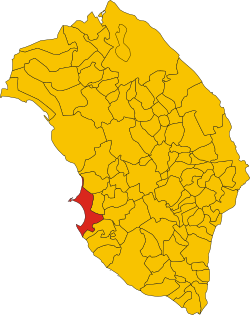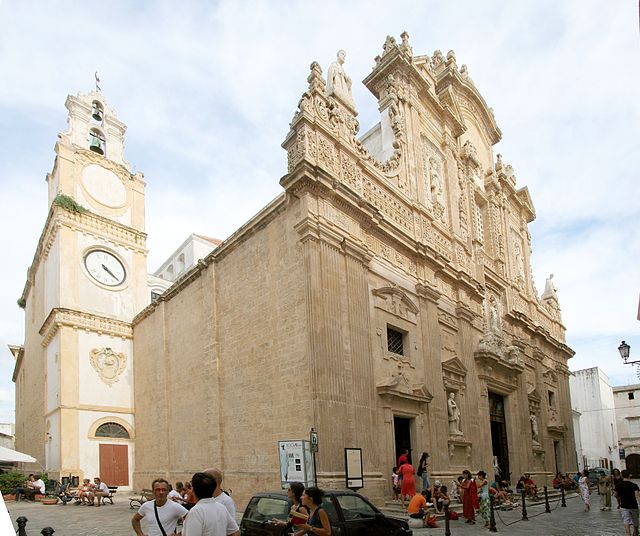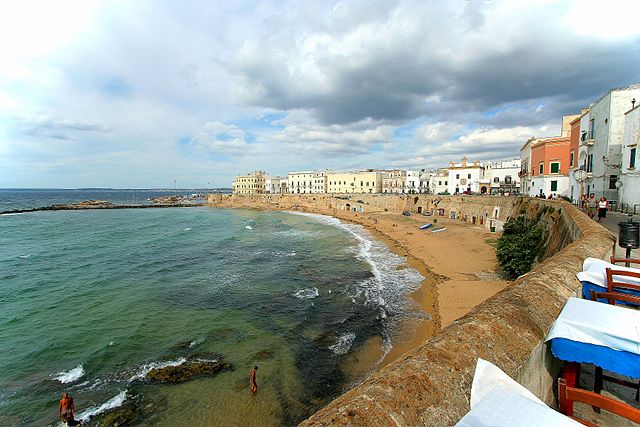Loading AI tools
Comune in Apulia, Italy From Wikipedia, the free encyclopedia
Gallipoli (Italian: [ɡalˈliːpoli]; Salentino: Caḍḍìpuli [kaɖˈɖiːpʊlɪ]; Ancient Greek: Καλλίπολις, romanized: Kallípolis, lit. 'Beautiful City') is a southern Italian town and comune in the province of Lecce, in Apulia. In 2014, it had a population of 31,862[2] and is one of the towns where the Greek dialect Griko is spoken.
Gallipoli
| |
|---|---|
| Comune di Gallipoli | |
 Gallipoli panorama | |
 Gallipoli within the Province of Lecce | |
| Coordinates: 40°03′20″N 17°59′30″E | |
| Country | Italy |
| Region | Apulia |
| Province | Lecce (LE) |
| Frazioni | Baia Verde, Lido Conchiglie, Lido San Giovanni, Rivabella, Torre del Pizzo |
| Government | |
| • Mayor | Stefano Minerva |
| Area | |
| • Total | 41.22 km2 (15.92 sq mi) |
| Elevation | 12 m (39 ft) |
| Population (31 October 2021)[2] | |
| • Total | 19,536 |
| • Density | 470/km2 (1,200/sq mi) |
| Demonym | Gallipolini |
| Time zone | UTC+1 (CET) |
| • Summer (DST) | UTC+2 (CEST) |
| Postal code | 73014 |
| Dialing code | 0833 |
| Patron saint | St. Sebastian, St. Agatha, St. Christine |
| Saint day | January 20 |
| Website | Official website |




The town is located by the Ionian Sea, on the west coast of the Salento Peninsula. The town of Gallipoli is divided into two parts, the modern and the old city. The new town includes all the newest buildings including a skyscraper. The old town is located on a limestone island, linked to the mainland by a bridge built in the 16th century.
The municipality borders with Alezio, Galatone, Matino, Sannicola and Taviano.[3] It counts the hamlets (frazioni) of Baia Verde, Lido Conchiglie, Lido San Giovanni, Rivabella and Torre del Pizzo.
According to a legend, the city was founded in ancient times by Idomeneus of Crete. Pliny the Elder attributes the foundation to the Senone Gauls, while more likely it was a Messapic settlement. Historically, what is known is that Gallipoli was a city of the Greater Greece, ruling over a large territory including today's Porto Cesareo. In 265 BC it sided with Pyrrhus and Taranto against ancient Rome, suffering a defeat which relegated it to a Roman colony (later a municipium).
In the early Middle Ages, it was most likely sacked by the Vandals and the Goths. Rebuilt by the Byzantines, Gallipoli lived an economically and socially flourishing period due to its geographical position. Later it was owned by the Roman Popes, and was a centre of fighting against the Greek monastic orders.
In the 11th century Gallipoli was conquered by the Normans and, in 1268, it was besieged by Charles I of Anjou, causing numerous inhabitants to flee to the nearby Alezio. The city was repopulated around 1300, under the feudal rule of the principality of Taranto. In 1484 the Venetians tried to occupy it, but without results. King Ferdinand I of the Two Sicilies started the construction of the port, which in the 18th century became the largest olive oil market in the Mediterranean.
After the unification of Italy (1861), Gallipoli was capital of a circondario, together with Lecce and Taranto.
Nearest airports are Brindisi, 88 kilometres (55 mi), and Bari, 200 kilometres (120 mi). Gallipoli can be reached from both of them via a freeway, the state road 101.
By train, it is connected to Lecce by the Ferrovie Sud-Est.
In past times the economy of Gallipoli was based on the international wine and oil commerce. Nowadays its most important activities are based on fishing and tourism.
Tourism is enjoyable throughout the year, due to the mild climate. Numerous festivals, both civil and religious, are also held. These include the Carnival, Easter and all the parades, Sant'Agata, and the Santa Cristina celebrations in July.
Gallipoli also boasts a very recently built harbour for private boats, located just steps from the bottom of the main Corso Roma.
The summer season starts in May and ends in October, when the weather is almost invariably hot and clear.
A sophisticated gay scene has developed around Gallipoli, often referred to as “Gay-lipoli”. The city is particularly well known as a destination for the Italian gay population [4] and has become “Italy’s gay summer paradise”.[5] A vibrant nightlife means Gallipoli draws an international gay crowd over the summer months, with visitors also being drawn by the nearby naturist beaches and the popular lidos at Baia Verde.
The local football team is the Gallipoli Calcio. The team won the 2005–06 Serie C2/C championship. They were promoted to Serie B for the first time in the club's short history after winning the 2008–09 Serie C1/B championship, although were instantly relegated and then refounded due to financial issues.
Gallipoli is twinned with:
Seamless Wikipedia browsing. On steroids.
Every time you click a link to Wikipedia, Wiktionary or Wikiquote in your browser's search results, it will show the modern Wikiwand interface.
Wikiwand extension is a five stars, simple, with minimum permission required to keep your browsing private, safe and transparent.